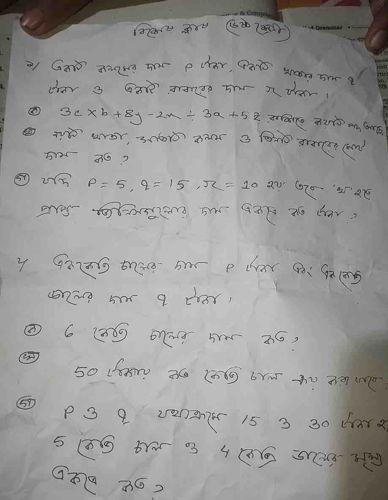Solve the following problems: 1) 3x + 8 = 2x + 5, 2) If P = 5, 9, 15, ..., 10 and 12 P add to 30, find P and Q. 3) 50 (x + 10) = 20x, 4) P = 3 and 4, derive values of P.

Answer
1) To solve the equation 3x + 8 = 2x + 5, start by isolating x. Subtract 2x from both sides: 3x - 2x + 8 = 5 This simplifies to: x + 8 = 5 Next, subtract 8 from both sides: x = 5 - 8 x = -3. 2) The sequence given is an arithmetic sequence. The nth term can be expressed as P(n) = 5n. The 10th and 12th terms are calculated by substituting n = 10 and n = 12: P(10) = 5(10) = 50, P(12) = 5(12) = 60. Given that these add up to 30, indicates an error in formulation because 50 + 60 cannot equal 30. Perhaps details are missing. 3) The equation 50(x + 10) = 20x expands to: 50x + 500 = 20x. To isolate x, subtract 20x from both sides: 50x - 20x + 500 = 0, 30x + 500 = 0. Now, subtract 500 from both sides: 30x = -500. Divide by 30 to find x: x = -500 / 30 = -16.67 approximately. 4) Given P = 3 and P = 4, introduce variables A and B if necessary but no further calculations are specified. If the question was to find a common value, it is ambiguous without context. If more conditions were provided to calculate Q or other terms, they'd be applied here. Summary: 1) x = -3, 2) Complicated without correct P values, 3) x = -16.67, 4) Needs context.